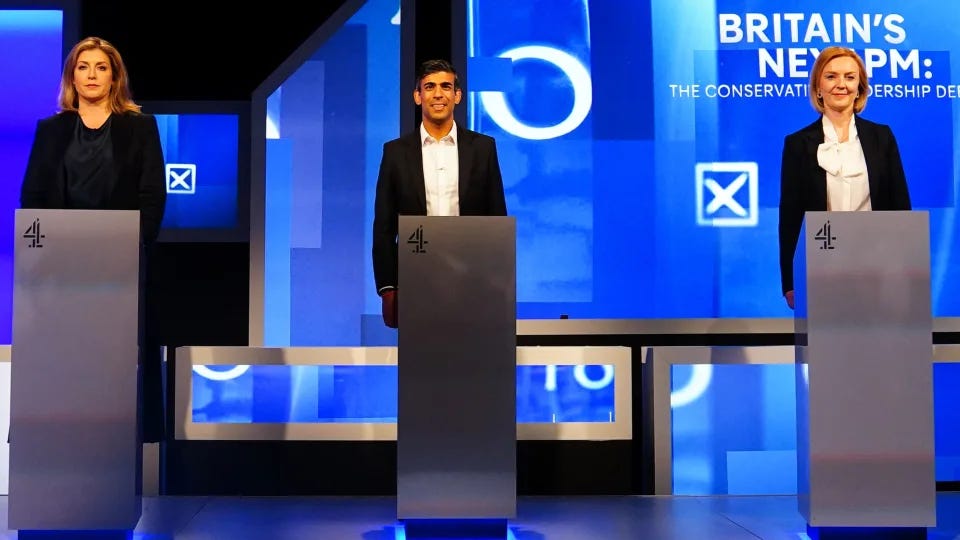Conservative leadership?
Now that the contest for the Conservative leadership has been whittled down to two candidates, we should look at what qualities might make a good leader.
Intelligent and hard-working?
In 1933 the chief of the German Army was quoted as saying:
Those who are clever and industrious I appoint to the General Staff. Use can under certain circumstances be made of those who are stupid and lazy. The man who is clever and lazy qualifies for the highest leadership posts. He has the requisite nerves and the mental clarity for difficult decisions. But whoever is stupid and industrious must be got rid of, for he is too dangerous.
Erstwhile Chancellor Rishi Sunak humblebrags that his greatest weakness is working hard. Potentially that could be a problem, if as PM he allows himself to get over-involved in minutiae to the detriment of ‘helicopter overview.’
With Liz Truss we have the problem of deciding whether she is stupid or lazy; or even both. For example, in the runup to the invasion of Ukraine she walked into a meeting with the Russian Foreign Minister Sergei Lavrov and told him ‘that the UK would never recognize Moscow’s sovereignty over the Voronezh and Rostov [Russian!] regions.’ It was hardly her first gaffe, but this one was huge: if you are going to confront a potential enemy, you absolutely must get your facts right. Lavrov accused her afterwards of being ‘unprepared.’
Truss has tried to ‘channel’ Margaret Thatcher, e.g. by the tank photo-op, and her choice of clothing for this leadership debate, thereby inviting damaging comparison, as Edwina Currie pointed out. At the least, this self-undermining image policy argues an inability to foresee presentational pitfalls, in a profession that relies so heavily on appearances.
Ability to dominate others
When General Montgomery first met Winston Churchill, the latter offered him alcohol. Monty replied, ‘I don’t drink and I don’t smoke, and I’m one hundred per cent fit.’ Churchill leaned forward and said, ‘I drink, and I smoke, and I’m two hundred per cent fit!’ Smiling at the memory decades later, Monty told the interviewer, ‘I thought then, we’ve got our man,’ i.e. someone with the aggression to lead the country to victory.
I may be wrong, but although Truss is ambitious, she doesn’t seem to have Thatcher’s intimidating diligence, force of personality and social skills, all necessary to bring the (still mostly male) serpents around the Cabinet table to order. I can imagine her as PM being briefed against, early and often.
Sunak is certainly clever - he used to be an investment analyst for Goldman Sachs (aka the ‘vampire squid.’) Like Gordon Brown, perhaps, he may come up with strategies, schemes and flowcharts - but can he lead? Like Truss, I think he’s a bit of a stiff, a natural big-corporation tie-wearer who chimes wrong when he tries casual as in the debate:

Ability to inspire
When Sven-Göran Eriksson chose David Beckham in 2001 to lead England in the World Cup, he said (and I wish I could find the quote) that Beckham had a winner’s state of mind that he could instinctively communicate to the rest of the team. That was borne out by England’s 5-1 victory against Germany in the qualifying rounds.
Beckham has often been guyed as apparently slow-minded or semi-inarticulate, but some people put one off by seeming too glib or ‘too clever by half.’
Does either Sunak or Truss pass the Beckham test?
Long-term vision
It’s been a long time since British politics has had a statesman at the helm. We stumble from one crisis to another; even Margaret Thatcher, voted in to ‘sort out the unions’, needed to cast about for a wider econo-political strategy and had to be guided into monetarism by Sir Keith Joseph.
In a way it can be an advantage not to have any beliefs. One of the reasons for Johnson’s entry to Number Ten is that his eyes had been fixed on personal greatness since childhood, irrespective of any moral or political principles. Rackety and sloppy, he was allowed to take over because he could see which way the political tide was turning, even while PM Theresa May was trying to hold it back, Canute-like.
Johnson’s egregious sense of entitlement, noted at Eton, is to many an attractive quality, even though perhaps it shouldn’t be. He has always felt that the rules needn’t apply to him; he is in a way a modern, a posh version of Neal Cassady. He is irrepressible - his resignation statement (7 July) and Parliamentary speech during the subsequent confidence debate (18 July) were amazingly bullish. Nothing will keep him down; goodness knows what further personal triumphs are ahead of him.
But what of our future?
The UK and the US have been systematically weakening themselves for what? forty years? while the East has been rising so rapidly at our expense and with the support of our multinational companies and globalist political class.
What will Sunak or Truss do to turn the tide? Do they want to?



